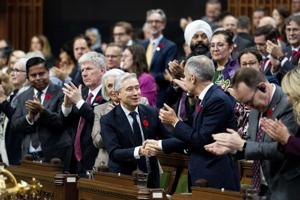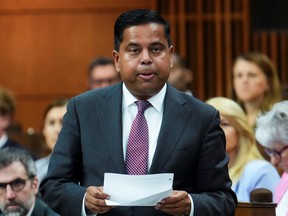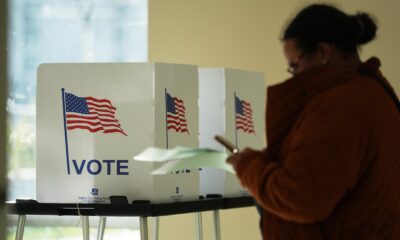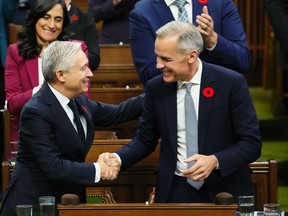Top Stories
Canadian Government Rejects Nuclear Disarmament Amid Global Tensions

UPDATE: The Canadian government has just confirmed its lack of interest in pursuing nuclear disarmament, raising alarms as global tensions escalate. Critics argue this decision could have dire consequences in the face of an increasingly volatile geopolitical landscape.
As international relations deteriorate, the urgency for Canada to adopt a proactive stance on nuclear disarmament has never been greater. While the world teeters on the brink of potential nuclear conflict, Canada remains firmly aligned with NATO and the status quo, choosing to prioritize military alliances over meaningful disarmament efforts.
The Non-Proliferation Treaty (NPT), established in 1968, has been criticized for allowing nuclear powers to maintain their arsenals while limiting non-nuclear states’ ambitions. In stark contrast, the Treaty for the Prohibition of Nuclear Weapons (TPNW), adopted on July 7, 2017, aims for complete nuclear disarmament but has faced significant opposition from nuclear states. As of now, 74 nations have ratified the TPNW, but the Canadian government has opted to support the NPT, effectively sidelining the TPNW’s vision for a nuclear-free world.
Prime Minister Mark Carney has reiterated Canada’s commitment to NATO, which he seems to view as a shield against nuclear threats. However, critics argue that this blind allegiance prevents Canada from developing an independent foreign policy focused on peace and disarmament. The country’s historical ties to the United States have led to a perception of Canada as a junior partner, often sacrificing its autonomy in international affairs.
Canada’s participation in NATO’s military strategies, including costly collaborations in ballistic missile defense, raises questions about its commitment to genuine peacekeeping efforts. In fact, Canada ranks as the third largest exporter of weapons globally, which starkly contrasts its self-portrayal as a peaceable nation.
The TPNW represents a significant threat to the nuclear status quo, as it seeks to abolish nuclear weapons entirely. Yet, Canada has distanced itself from this treaty, despite the growing urgency for global disarmament. The failure to engage with the TPNW has been exemplified by the former Prime Minister Justin Trudeau, who notably refused to meet with Setsuko Thurlow, a Hiroshima survivor and advocate for nuclear abolition, when she received the Nobel Peace Prize on behalf of the International Campaign to Abolish Nuclear Weapons (ICAN).
With the world watching, Canada’s decision to disregard the pressing need for disarmament is increasingly concerning. As military tensions rise, the call for countries to adopt independent and peace-focused policies becomes ever more critical. The Nobel Peace Prize Committee has emphasized the need for a viable alternative to nuclear deterrence, urging nations like Canada to break free from military dependencies.
The question remains: will Canada choose to align with the global movement for nuclear abolition, or will it continue its support of outdated treaties that prioritize the interests of nuclear powers? As developments unfold, the future of global nuclear disarmament hangs in the balance, and Canada’s role will be pivotal in determining the path forward.
Stay tuned for further updates on this developing story as we continue to monitor Canada’s stance on nuclear disarmament and the implications for international security.
-

 World4 months ago
World4 months agoScientists Unearth Ancient Antarctic Ice to Unlock Climate Secrets
-

 Politics1 day ago
Politics1 day agoSecwepemc First Nation Seeks Aboriginal Title Over Kamloops Area
-

 Entertainment4 months ago
Entertainment4 months agoTrump and McCormick to Announce $70 Billion Energy Investments
-

 Lifestyle4 months ago
Lifestyle4 months agoTransLink Launches Food Truck Program to Boost Revenue in Vancouver
-

 Science4 months ago
Science4 months agoFour Astronauts Return to Earth After International Space Station Mission
-

 Technology2 months ago
Technology2 months agoApple Notes Enhances Functionality with Markdown Support in macOS 26
-

 Top Stories4 weeks ago
Top Stories4 weeks agoUrgent Update: Fatal Crash on Highway 99 Claims Life of Pitt Meadows Man
-

 Sports4 months ago
Sports4 months agoSearch Underway for Missing Hunter Amid Hokkaido Bear Emergency
-

 Politics3 months ago
Politics3 months agoUkrainian Tennis Star Elina Svitolina Faces Death Threats Online
-

 Politics4 months ago
Politics4 months agoCarney Engages First Nations Leaders at Development Law Summit
-

 Technology4 months ago
Technology4 months agoFrosthaven Launches Early Access on July 31, 2025
-

 Top Stories2 weeks ago
Top Stories2 weeks agoFamily Remembers Beverley Rowbotham 25 Years After Murder





















